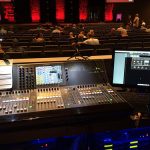Pitch Perfect? – Part 3
In my last couple of articles I’ve been talking about pitch correction and alternatives to using it. Today I want to talk a bit about the pitch correction debate and where I am OK with using pitch correction. I realize some of my readers and friends may disagree philosophically with me on some or all of this, and I can respect that.
I recently had a conversation with an engineer friend of mine about pitch correction, and he had what I thought was a compelling argument for why he employs pitch correction at the churches where he mixes. I don’t necessarily agree with this stance, but it did make me think a bit.
Basically, his point was he uses pitch correction to make some of the singers he has more palatable for the room. He does this because the singers are not professionals and by making them easier to listen to, he feels that makes it easier for the room to engage with them. Ultimately why we do what we do with music in churches is to facilitate everyone in the room engaging and participating together. Sure, as engineers we all want it to sound great, but this extra participation bit is one of the things that I believe separates what we do from performance driven live music.
Personally, my preference is to work with singers who are having trouble and remove the ones who ultimately can’t consistently hit the bar. In other words, I’m not a fan of using pitch correction on people who can’t sing well.
But why is that?
And why is there a large, or at least vocal contingency of people who also feel the same way?
And why do we get so passionate about where we stand on the issue?
As I’ve been pondering this, I’ve wondered if this actually goes beyond an argument for talent and ability. Maybe there’s a morality side to the issue. That could seem a little extreme, but hang with me.
In showbiz, there has always been a bit of artifice and construct to the whole thing. We dress people up in costumes and put them on stages or in films sometimes in exotic and even fictional locations. The stories we tell range from true to the most absurd imaginable. Within that spectrum, however, I believe great popular art still has an authenticity to it.
Let’s take popular music for example. Think of some of the classic acts of the last 50 years: the Stones, the Beatles, Springsteen, U2, Prince, Michael Jackson, the Eagles, Madonna, the Police, Queen, Nirvana, etc. What we see on stage and in media may be exaggerated to some extent and the rock stars may be a bit of characterizations, however, deep down I believe we can still see a bit of who those artists really are. Their truth comes through the packaging and displays through their performances, and that’s part of what I believe attracts people to their art. It’s that connection with the real.
When it comes to pitch correction, I think some of us–maybe many of us–have a problem with it because it is fundamentally creating and hiding a lie.
I think people have an expectation when they see someone performing on stage, and that expectation probably varies depending on the genre of music, age of the audience member, cultural background, etc. For many people, though, if someone is performing, they expect that the person can actually perform. When the expectation doesn’t fit the truth, there can be quite a backlash.
I was in high school when the Milli Vanilli lip sync stuff came to light, and it obliterated their careers. When similar accusations were thrown at Paula Abdul, her music career also suffered. Those two examples are a little different because they dealt with outright vocal replacement, however, I think many view pitch correction as not far off from complete replacement. Culture and acceptability might have changed a bit over the last 25 years, but I don’t think there has been an across the board acceptance or tolerance for the use of blatant pitch correction.
For example, if we hear that pop-star “X” uses extensive pitch correction in the studio, not everyone gets so upset, and it’s almost expected that someone is tuning them. I know with a little bit of googl’ing you can find isolated tracks of a certain pop star who graduated from a large family-oriented network who is still working in music. In fact, the last time I checked her latest record seems to be doing quite well in the iTunes charts.
However, that acceptability isn’t necessarily the case for other genre’s. I remember hearing the backlash not long ago when an Aretha Franklin tune hit with audible pitch correction employed. To use a current generation star, I also know several people who weren’t happy with Adele’s vocals on her latest record and felt they were over-tuned. When Adele was sort-of accused of this by producer Tony Visconti, she didn’t pull punches in her response to him which I think also illustrates the sensitivity of this debate.
But what does this mean in terms of music we are performing in our churches?
Authenticity is the buzz-word of the day, although, I don’t think a desire for authenticity is anything new. As I hope I alluded to above, authenticity is something I believe we have always been after as humans, and it’s authenticity that has drawn us to the biggest artists over the years. So does the use of pitch correction sacrifice the authenticity we need to present the music we’re doing alongside the Gospel? I think trying to introduce people to the true Jesus has always been a challenge when there have always been plenty of people now and throughout history who claim to follow Jesus when their actions say otherwise.
So when someone walks into a church, what do they expect of the people on the platform? How would someone who is new to your church and trying to find out about Jesus respond if they knew people on stage were being auto-tuned because they can’t actually hit the notes? Is using pitch correction going to create another hurdle for the church to overcome? Would their opinion change if it was a background singer or someone in a choir compared to a lead? Are we going to need to start putting up slides and listing pitch correction use in our programs? Maybe something like: We use pitch correction on our vocalists for your listening enjoyment.
I don’t know that there are black and white answers to all of these questions because every situation is going to be different. Maybe these questions even seem a bit extreme, however, I think it’s something worth thinking about because details matter. Personally, I lean towards the side of not using pitch correction, however, there are times when I’m OK with it.
For example, when a singer is already a good to great singer, I’m OK with using a bit of pitch correction. If a little pitch correction is going to put a bit of polish on their performance and they would like to have it, I’m OK with it. In the studio, it’s not unusual for me to manually adjust a note here or there if something sounds off, but I don’t run an entire vocal through processing. In the live arena, not everybody has a good day everyday, and if I can help my artist(s) have a better day that’s what I’d like to do. Historically it has been more difficult to do this live, but that doesn’t mean that will always be the case and in some ways the new Waves Tune Real-Time plug-in gets us closer.
Here’s an example where I would have liked some form of pitch correction. Several years ago I was mixing a big ensemble song for broadcast. I had around a dozen lead singers on the song all swapping between lead and support duties, and I was mixing it all on the fly without any snapshots. It took some rehearsing both for myself and the vocalists, but I felt great about the mix and I was excited for the actual performance. In the actual performance everything was going great until we got to the end of the song where one of the vocalists had to hit and hold a high note. She had nailed it in rehearsal, but in the performance she missed the note and landed a bit flat.
I wish I could have helped her out that day. She was a talented vocalist, and I loved mixing her. She was perfectly capable of performing the song and had already demonstrated that multiple times. However, as happens to everyone from time to time, she went out that day and missed. A pitch correction safety-net would have come in handy that very day.
So I guess that’s a good way to explain my feelings about pitch correction for live use. I’m not looking for correction, but I’m OK with using a safety net.
Now, I know some of you might were hoping I would get into my thoughts on the new plug-in from Waves, but since this got a bit long I promise I will talk about it in for Part 4. In the meantime, I’m curious and would love to know your thoughts and feelings on the use of pitch correction. Is it OK to use and why do you feel that way? If you’re against it under any circumstances, why do you feel that way?

 Next Post
Next Post


